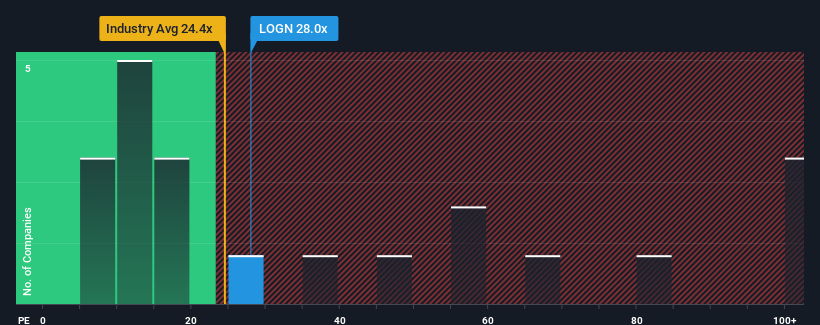- Switzerland
- /
- Tech Hardware
- /
- SWX:LOGN
Logitech International S.A.'s (VTX:LOGN) Price Is Out Of Tune With Earnings

When close to half the companies in Switzerland have price-to-earnings ratios (or "P/E's") below 21x, you may consider Logitech International S.A. (VTX:LOGN) as a stock to potentially avoid with its 28x P/E ratio. However, the P/E might be high for a reason and it requires further investigation to determine if it's justified.
Logitech International certainly has been doing a good job lately as it's been growing earnings more than most other companies. The P/E is probably high because investors think this strong earnings performance will continue. If not, then existing shareholders might be a little nervous about the viability of the share price.
View our latest analysis for Logitech International

Does Growth Match The High P/E?
There's an inherent assumption that a company should outperform the market for P/E ratios like Logitech International's to be considered reasonable.
Taking a look back first, we see that the company grew earnings per share by an impressive 17% last year. However, this wasn't enough as the latest three year period has seen a very unpleasant 44% drop in EPS in aggregate. Therefore, it's fair to say the earnings growth recently has been undesirable for the company.
Shifting to the future, estimates from the analysts covering the company suggest earnings should grow by 12% per year over the next three years. Meanwhile, the rest of the market is forecast to expand by 11% per annum, which is not materially different.
In light of this, it's curious that Logitech International's P/E sits above the majority of other companies. Apparently many investors in the company are more bullish than analysts indicate and aren't willing to let go of their stock right now. These shareholders may be setting themselves up for disappointment if the P/E falls to levels more in line with the growth outlook.
The Key Takeaway
We'd say the price-to-earnings ratio's power isn't primarily as a valuation instrument but rather to gauge current investor sentiment and future expectations.
Our examination of Logitech International's analyst forecasts revealed that its market-matching earnings outlook isn't impacting its high P/E as much as we would have predicted. Right now we are uncomfortable with the relatively high share price as the predicted future earnings aren't likely to support such positive sentiment for long. Unless these conditions improve, it's challenging to accept these prices as being reasonable.
Many other vital risk factors can be found on the company's balance sheet. Take a look at our free balance sheet analysis for Logitech International with six simple checks on some of these key factors.
You might be able to find a better investment than Logitech International. If you want a selection of possible candidates, check out this free list of interesting companies that trade on a low P/E (but have proven they can grow earnings).
New: AI Stock Screener & Alerts
Our new AI Stock Screener scans the market every day to uncover opportunities.
• Dividend Powerhouses (3%+ Yield)
• Undervalued Small Caps with Insider Buying
• High growth Tech and AI Companies
Or build your own from over 50 metrics.
Have feedback on this article? Concerned about the content? Get in touch with us directly. Alternatively, email editorial-team (at) simplywallst.com.
This article by Simply Wall St is general in nature. We provide commentary based on historical data and analyst forecasts only using an unbiased methodology and our articles are not intended to be financial advice. It does not constitute a recommendation to buy or sell any stock, and does not take account of your objectives, or your financial situation. We aim to bring you long-term focused analysis driven by fundamental data. Note that our analysis may not factor in the latest price-sensitive company announcements or qualitative material. Simply Wall St has no position in any stocks mentioned.
About SWX:LOGN
Logitech International
Through its subsidiaries, designs, manufactures, and markets software-enabled hardware solutions that connect people to working, creating, gaming, and streaming worldwide.
Flawless balance sheet with proven track record.
Similar Companies
Market Insights
Community Narratives




